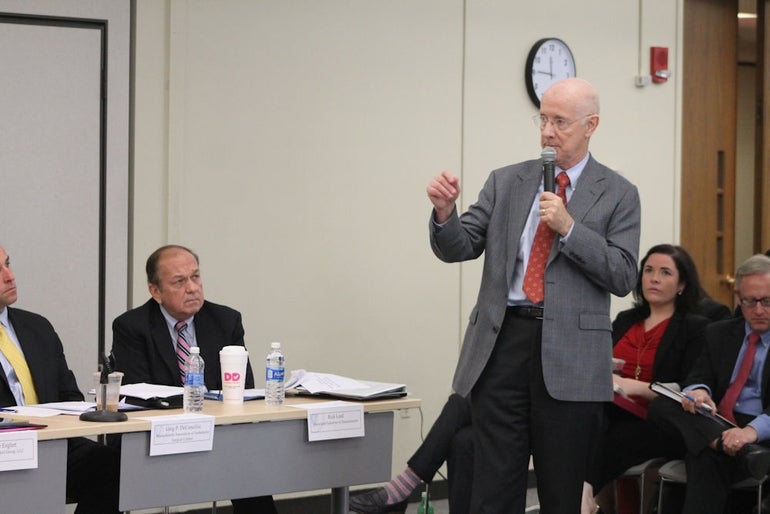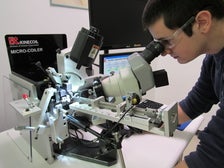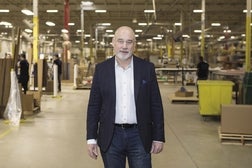Commission weighs interventions to narrow health care price differentials
 Antonio Caban/SHNS
Harvard professor Joseph Newhouse on Tuesday gave a presentation on Medicare payments at the second public meeting of a special state commission tasked with studying health care pricing in Massachusetts.
Antonio Caban/SHNS
Harvard professor Joseph Newhouse on Tuesday gave a presentation on Medicare payments at the second public meeting of a special state commission tasked with studying health care pricing in Massachusetts.
A special commission studying health care pricing in Massachusetts grappled Tuesday with questions of responsibility, discussing the roles employers and commercial health plans should play in narrowing the gap in prices charged by health care providers.
Tuesday's gathering was the second public meeting of the 23-member panel, created as part of a law passed this summer to avoid a ballot question fight over pricing. The panel has until March to report its recommendations and any draft legislation.
After hearing a presentation on Medicare payments from Harvard health policy professor Joseph Newhouse, members of the commission launched into discussion on why prices may differ, including quality of care, location of the facility and the population being served.
Sen. James Welch, who chairs the commission along with Rep. Jeffrey Sanchez, said quality is "perhaps the most discussed, and in my opinion, maybe other people's opinion, most appealing basis on which prices for health care service could or should vary."
Both Medicare and MassHealth, the state's Medicaid program, use payment incentives aimed at increasing quality and adjust payments based on a provider's location. They also provide additional funding for hospitals that serve low-income, rural or underserved populations.
With those adjustments in place on the public payer end, commission members raised the possibilities of private insurers taking similar steps and how that would affect employers who provide insurance for their staff.
Members of the commission, representing insurers, hospitals, employers and other groups, have outlined a range of priorities for their work over the next few months as they explore a set of issues that have vexed lawmakers for years and consider whether regulatory or statutory solutions are possible.
Massachusetts Hospitals Association president and CEO Lynn Nicholas said that as an employer, she wants her workers to get care from the hospitals and doctors of their choice but such a mindset can lead to a system that "benefits certain kinds of hospitals" over others, disadvantaging those in poorer communities or that serve populations with greater needs.
"So when we talked about this in our long, tedious processing with our full membership, there was a sense that while commercial rates have no recognition of that now, that they probably should, that it's a societal responsibility," Nicholas said.
Audio: Health Care Pricing Commission Meeting
Lora Pellegrini of the Massachusetts Association of Health Plans said the business community should be part of the discussion on "whether it is appropriate for businesses in the commonwealth to pick up shortfalls that might exist in MassHealth and potentially with Medicare, that somehow the commercial market should make up for those shortfalls."
"We've known for years that our members, part of their premiums reflect shortfalls in the public programs, and we'd love to see that go away," Associated Industries of Massachusetts President Rick Lord said. "I don't see a state with this fiscal situation increasing Medicaid reimbursement levels by any significant amount. Although I'd love for that to happen, I'm not sure that I see that in the future."
Lord said that because of limited data available to them he did not think consumers had the "ability to make intelligent choices." Employers and employees would need to be provided with "better tools," he said.
Steve Carey, the vice president of human resources at Polar Beverages, touted the "tremendous educational process" his company provides for workers, including a "concierge" to answer questions about health coverage. He said his company offers a tiered plan in which employees pay more out-of-pocket if they want to receive care from a higher-cost hospital, and that employers need to educate their workers.
Other members said the challenge is greater for small businesses with fewer resources.
Pellegrini said her member plans believe strongly "that there needs to be a short-term government intervention" and that consumer education and product design are not enough to diminish price variation. She said offering tiered networks has been a requirement for six years, and in that time price disparities "have actually gotten wider."
"I look at that, and I don't think product design alone is going to solve the problem," she said.
The commission will meet next on Nov. 1 to discuss rate adjustment factors. Subcommittee meetings are also planned for next month.
The state monitoring committee, which is chaired by TrueNorth Transit Group principal Connie Englert, will meet Nov. 10.
The market forces subcommittee, chaired by Blue Cross and Blue Shield of Massachusetts chief operating officer Deborah Devaux, will meet Nov. 16.
The transparency subcommittee, led by Boston Medical Center president and CEO Kate Walsh, is set to meet on Nov. 17.












0 Comments